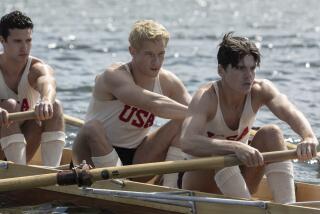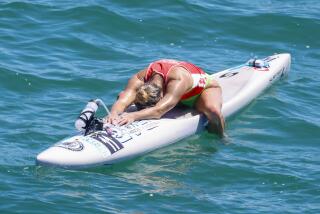‘I have to exert myself sometimes. Being so darn small isn’t something I have cared for, but you have to put up with it.’
- Share via
For 70 years, Del Beekley has been getting up before 5 a.m. most days of the week. Although he made a living selling insurance , the reason he rose in the dark was to watch oars strike the water at a perfect angle , to coax rowers into precise form, and for a time, to be the winningest coxswain in the country. As a teen - ager , he took a seat in the stern of a shell with the San Diego Rowing Club--you can find aged photographs of him at the old rowing club turned Chart House restaurant--and went on to coach high school and San Diego State College teams. He says he watched San Diego rowing grow from a couple of state competitions to the annual Crew Classic he helped initiate 14 years ago. When the Mission Bay Aquatic Center opened a new Rowing Center in 1976, it was named for H. Del Beekley, “San Diego’s father of collegiate rowing.” At 88, the morning breeze is chilly, but Beekley is up coaching a crew of businessmen to win a race in the annual competition in April. He was interviewed by Nancy Reed and photographed by Dave Gatley.
The hardest thing is getting up at quarter to five in the morning to be on the water by 6 o’clock. It takes motivation. You don’t get paid for it--it’s the fun of the competition. The big reward is when you race. When we were training for the nationals at the San Diego Rowing Club, we were actually living right at the club in order to be able to get up and get on the water.
I look on 1928 as one of my most successful years because we went back and practically went to the Olympics. If we had been just one or two seconds faster.
Fact of the matter is, we should have won that race. It was in Philadelphia. We were supposed to follow the course and it was rough as the dickens that day, and Harvard cuts kind of off course into smoother water and just barely beat us. So we were pretty put out about that. Actually, we had a better crew. But they went to Amsterdam and we didn’t.
After that, I decided from other people’s opinion of me that I was probably good enough to stay in the business.
I have always been 5 foot and 115 to 120 pounds. Being small like that, I always had a kind of inferiority complex, so the first thing that gave me some confidence was--I did well in track. Friends pressured me into it. Smaller persons go in for coxswain and larger people go out for rowing. I wouldn’t brag about it, but it’s true to an extent that it makes you feel important.
The coxswain just sits in the stern and steers it, and tells them how to row.
You get that with experience. All my coaching comes from previous experience.
When I first started out, we had a certain way of rowing. The stroke is the manner of going through a whole movement--starting with legs, hands and shoulders all at the same time, and making a good smooth stroke all the way through. Three sources of power are working together.
Then, back in the ‘60s, they got working on the idea that they thought it would be a whole lot better to give it drive with their legs first, see, then with their back and come in on their arms. You have about three different movements--I could see no sense in it.
I figured we had our success in the early days because it was a form that was more efficient.
I used to have all kinds of conflict. I was doing some coaching here at the rowing club, and at the aquatic center, and coaches were teaching the new method of “shooting their tails” and I never shifted.
Now, I find that most of the universities are getting back to the old form I was trained under.
When I first started out, I didn’t expect to end up as well as I did. It was a result of taking command of the crews and situations.
People become officers in the service because of their ability to command--it is the same thing. It depends on personality and ability to influence other people. I just learned it.
I have to exert myself sometimes. Being so darn small isn’t something I have cared for, but you have to put up with it.
Some people are born to be doctors, pilots or something. It was natural for me to get into a coxswain job.
I have gotten an awful lot of good friends. I enjoy the camaraderie.
In April, I will have been in the rowing business 70 years. It’s not every coxswain that has gone that far.


